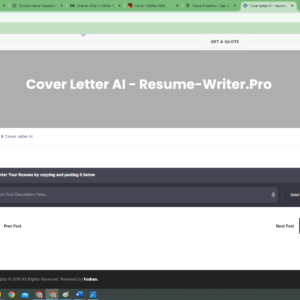Description
Introduction to AI in Legal Services
The legal industry, traditionally reliant on manual processes, has seen a revolutionary transformation with the advent of artificial intelligence (AI). Historically, legal drafting involved labor-intensive tasks, requiring extensive research, meticulous attention to detail, and significant time investments. Legal professionals would sift through vast amounts of data, precedent cases, and statutes to ensure the accuracy and comprehensiveness of their documents. This manual approach, while thorough, often led to extended timelines and increased costs.
Artificial intelligence is reshaping this landscape by introducing unprecedented efficiency and accuracy into legal services. AI-powered tools can quickly analyze and interpret large volumes of legal data, identifying relevant information and patterns that might be overlooked by human eyes. These tools are not only expediting the drafting process but also enhancing the quality of legal documents. By automating repetitive tasks, AI allows legal professionals to focus on more complex and nuanced aspects of their work, ultimately improving productivity and client satisfaction.
One of the most significant applications of AI in the legal field is in drafting separation agreements. These agreements, crucial in family law, outline the terms of a couple’s separation, including asset division, child custody, and support arrangements. Traditional drafting of separation agreements can be lengthy and fraught with potential for human error. AI-driven drafting tools can streamline this process, ensuring that agreements are comprehensive, legally sound, and tailored to the specific circumstances of each case.
The integration of AI in legal services represents a paradigm shift, offering a blend of speed, precision, and reliability that was previously unattainable. As we delve deeper into the role of AI in drafting separation agreements, it becomes clear that this technology not only revolutionizes the practice of family law but also sets new standards for the entire legal industry.
The Need for Efficient Separation Agreement Drafting
Separation or divorce is a highly stressful period for those involved, often compounded by the complexities and emotional strain associated with drafting a separation agreement. Traditionally, crafting a legally sound separation agreement requires extensive legal knowledge and a thorough understanding of the couple’s financial and personal circumstances. This process can be both time-consuming and overwhelming for individuals already navigating the emotional landscape of a breakup.
One significant challenge lies in the intricate details that must be meticulously outlined in a separation agreement. These details include the division of assets, debt responsibilities, child custody arrangements, and spousal support. Each of these components must be addressed with precision to ensure that the agreement is fair and legally enforceable. The complexity of these issues often necessitates the involvement of legal professionals, which can be prohibitively expensive for many couples.
Moreover, the traditional approach to separation agreement drafting is not only costly but also time-intensive. Legal practitioners typically require several consultations to gather all necessary information, followed by multiple revisions to ensure accuracy and compliance with legal standards. This protracted process can extend the already lengthy and emotionally taxing experience of divorce, delaying resolution and prolonging uncertainty for both parties.
The financial burden of traditional legal services further exacerbates the situation. Legal fees can quickly accumulate, creating additional stress for individuals who may already be facing financial instability due to the separation. This often leaves couples in a difficult position where they must balance the need for a thorough and legally sound agreement with the desire to minimize costs and expedite the process.
Given these challenges, there is a clear need for more efficient and cost-effective solutions for drafting separation agreements. AI-powered tools offer a promising alternative by streamlining the process, reducing costs, and alleviating some of the emotional strain associated with traditional methods. These technologies can simplify the drafting process, making it more accessible and manageable for individuals navigating the complexities of separation or divorce.
How AI Drafting Works
The advent of AI-powered separation agreement drafting has fundamentally transformed the landscape of family law. At its core, this technology leverages sophisticated algorithms and natural language processing (NLP) to create legally sound documents with remarkable precision and efficiency. The process begins when a user inputs essential information concerning the separation, such as personal details, financial assets, custody preferences, and other pertinent factors. This data is then processed by machine learning algorithms that have been trained on vast datasets of legal documents and precedents.
Natural language processing plays a pivotal role in interpreting and understanding the nuances of the input data. By comprehending the context and semantics of the provided information, the AI can accurately translate user inputs into appropriate legal language. This ensures that the generated separation agreement adheres to legal standards and is tailored to the specific needs and circumstances of the parties involved.
One of the key advantages of AI-powered drafting is its ability to deliver results with unprecedented speed. Traditional methods of drafting separation agreements can be time-consuming, often requiring multiple revisions and consultations. In contrast, AI can produce a comprehensive and customized document in a fraction of the time. This efficiency not only accelerates the legal process but also reduces the emotional and financial burden on the parties.
Moreover, the accuracy of AI-generated agreements is continually enhanced through machine learning. As the AI system processes more data and receives feedback, it refines its algorithms to improve the quality and reliability of the documents it produces. This iterative learning process ensures that the separation agreements are both legally robust and reflective of current legal standards and practices.
Customization is another significant benefit offered by AI-powered drafting tools. Users can specify unique preferences and conditions, and the AI will incorporate these into the final document. This level of personalization ensures that the agreement is not only legally sound but also aligns with the individual needs and priorities of the parties involved.
Advantages of AI-Generated Agreements
Utilizing AI for drafting separation agreements brings a myriad of advantages that revolutionize the traditional family law landscape. One of the primary benefits is substantial time savings. AI-powered tools can generate comprehensive and precise agreements in a fraction of the time it would take a human lawyer. This efficiency not only accelerates the separation process but also allows legal professionals to focus on more complex aspects of their cases, thereby improving overall service quality.
Cost efficiency is another significant advantage of AI-generated agreements. Traditional legal services can be prohibitively expensive, often deterring individuals from seeking the assistance they need. AI tools, on the other hand, offer a more affordable alternative. By automating the drafting process, these tools can reduce the hours billed by attorneys, making legal services more accessible to a broader audience. This democratization of legal assistance can be particularly beneficial for clients with limited financial resources.
Reduction of human error is a critical aspect where AI excels. Even the most experienced lawyers can make mistakes, especially when dealing with complex legal documents. AI algorithms, however, are designed to minimize these errors by following stringent protocols and cross-referencing vast legal databases. This heightened accuracy ensures that the agreements are not only legally sound but also free from inadvertent omissions or inconsistencies.
Accessibility is another compelling reason to adopt AI in the drafting of separation agreements. AI-powered platforms are available 24/7, enabling clients to access legal assistance at their convenience. This flexibility is particularly valuable in today’s fast-paced world, where time constraints and varying schedules can pose significant challenges. Moreover, these platforms often come with user-friendly interfaces, making it easier for individuals to navigate through the separation process without feeling overwhelmed.
Real-world examples underscore these advantages. For instance, according to a report by McKinsey, AI could save the legal industry up to $100 billion annually by automating routine tasks. Furthermore, a study by LawGeex found that AI-powered systems were able to review legal documents with 94% accuracy, compared to 85% for human lawyers. These statistics highlight the transformative potential of AI in making the separation process less stressful and more efficient for all parties involved.
Ensuring Legal Validity and Review by Family Law Lawyers
While AI-powered tools offer significant advancements in drafting separation agreements, the role of family law lawyers remains indispensable. These agreements must comply with various legal standards and address specific circumstances unique to each case. AI can streamline the drafting process, but human oversight is crucial for ensuring legal validity. Family law lawyers possess the expertise to interpret complex legal nuances, something AI, despite its capabilities, cannot fully replicate.
One of the primary reasons for lawyer review is to ensure that the AI-generated agreements meet all relevant legal requirements. Each jurisdiction has its own statutes and case law governing separation agreements, and a family law lawyer can ensure that these specific mandates are met. The lawyer’s role is to verify the accuracy and completeness of the AI-generated document, ensuring it is legally binding and enforceable.
Moreover, family law cases often involve unique circumstances that a generalized AI model may not fully capture. These can include specific financial arrangements, custody agreements, or other personalized terms that need tailored legal language. A family law lawyer can address these nuances, providing a level of customization and legal insight beyond the scope of AI. Their review ensures that all parties’ interests are adequately represented and that the agreement is fair and equitable.
Additionally, having a lawyer review the AI-generated agreement fosters a collaborative approach. The AI tool serves as a complement to the lawyer’s expertise, not a replacement. It allows legal professionals to focus on more complex aspects of the case, enhancing efficiency without compromising the quality of legal counsel. This partnership between AI and lawyers ensures that clients receive the best of both worlds: the efficiency of AI-driven drafting and the nuanced understanding of human legal expertise.
In conclusion, while AI-powered tools revolutionize the drafting of separation agreements, the review and validation by family law lawyers are essential. This synergy between technology and human oversight ensures that agreements are not only efficient but also legally sound and tailored to individual needs.
Cost and Time Savings for Clients
The advent of AI-powered separation agreement drafting is not just a technological marvel but a pragmatic solution for clients seeking cost-effective and time-efficient legal services. Traditional legal drafting often involves extensive lawyer-client consultations, multiple revisions, and significant billable hours, which can quickly escalate costs. In contrast, AI-driven services streamline the process by automating many of these steps, resulting in substantial savings for clients.
Consider hypothetical scenarios to illustrate the contrast. A traditional separation agreement might require 10 to 20 hours of a lawyer’s time, billed at an average rate of $200 to $400 per hour. This could result in legal fees ranging from $2,000 to $8,000. Additionally, the process could span several weeks or even months, depending on the complexity of the case and the availability of both parties and their legal representatives.
In comparison, an AI-powered separation agreement drafting service can significantly reduce these figures. With AI, the drafting process leverages advanced algorithms and machine learning to quickly generate initial drafts based on the clients’ inputs. This system can cut down the drafting time to a matter of hours, if not minutes. The reduced need for manual intervention not only accelerates the turnaround time but also slashes the associated costs. Clients might only need to invest a few hundred dollars for a comprehensive and customized agreement, rather than thousands.
Moreover, the AI system’s ability to handle repetitive and routine tasks with high accuracy further minimizes the risk of errors, which can lead to additional time and cost savings. The expedited process allows clients to reach resolutions faster, reducing the emotional and financial strain typically associated with prolonged legal proceedings.
By embracing AI in separation agreement drafting, clients stand to benefit from a more efficient, affordable, and less stressful legal experience. This innovation represents a significant leap forward in making family law services more accessible and manageable for everyone involved.
The Future of AI in Family Law
The future of AI in family law holds immense potential, with ongoing advancements poised to revolutionize the delivery of legal services. As AI technology continues to evolve, we can anticipate significant enhancements in how legal professionals approach family law cases. One of the key areas of development is the increasing sophistication of natural language processing (NLP) algorithms, which enable AI systems to better understand and generate human language. This improvement can lead to more accurate and efficient drafting of legal documents, such as separation agreements, thereby reducing the time and resources required for these tasks.
Moreover, AI’s ability to analyze vast amounts of data quickly and accurately will further streamline the legal process. Predictive analytics, powered by AI, can help lawyers foresee potential outcomes of cases based on historical data and trends. This capability not only aids in strategic decision-making but also enhances the overall efficiency and effectiveness of legal practice. Additionally, machine learning models can be trained to recognize patterns and anomalies in legal documents, ensuring higher levels of accuracy and compliance with legal standards.
As AI technology continues to advance, we are likely to see broader adoption across various legal domains beyond family law. For instance, AI-powered tools can be utilized in corporate law for contract analysis, in criminal law for evidence examination, and in intellectual property law for patent searches. These applications can significantly reduce the manual workload of legal professionals, allowing them to focus on more complex and strategic aspects of their practice.
Furthermore, the integration of AI in legal services is expected to democratize access to justice. By reducing the cost and complexity of legal processes, AI can make legal assistance more accessible to individuals and small businesses that might otherwise be unable to afford it. This shift could lead to a more equitable legal system, where legal resources are available to a broader population.
Overall, the future of AI in family law and the broader legal profession looks promising. As technology continues to advance, we can expect AI to play an increasingly integral role in enhancing the efficiency, accuracy, and accessibility of legal services, ultimately transforming the landscape of legal practice.
AI Lawyer Website for Sale: A Unique Opportunity
In an era where technology is rapidly transforming the legal landscape, the availability of an AI lawyer website for sale represents a significant business opportunity. This platform, specifically designed to assist with separation agreement drafting, leverages advanced artificial intelligence to offer unparalleled precision and efficiency. The website stands out due to its innovative features, which include automated document generation, real-time legal advice, and a user-friendly interface. These capabilities not only streamline the legal process but also ensure that users receive accurate and personalized legal support.
The market potential for such a legal tech platform is substantial. The demand for accessible and affordable legal services is growing, particularly in the realm of family law. By acquiring this AI lawyer website, potential buyers can capitalize on the increasing trend of digital legal solutions. The platform is already equipped with a robust framework and a scalable architecture, allowing for easy integration of additional features and services. This positions the website as a versatile tool that can adapt to various legal needs beyond separation agreements.
Owning this cutting-edge platform offers numerous benefits. Firstly, it provides a competitive edge in the legal industry by utilizing state-of-the-art AI technology. Secondly, the website’s design prioritizes user experience, ensuring that clients find it intuitive and reliable. Moreover, the platform’s ability to handle sensitive legal matters with confidentiality and accuracy enhances its credibility and trustworthiness. Potential buyers will also benefit from the website’s existing user base and positive reputation, offering a solid foundation for future growth.
For those interested in exploring this unique opportunity, further details and inquiries can be directed to the current owner via the provided contact information. This sale represents a chance to own a pioneering digital legal service that is poised to revolutionize the way family law is practiced. Don’t miss out on the opportunity to be at the forefront of legal technology innovation.0









